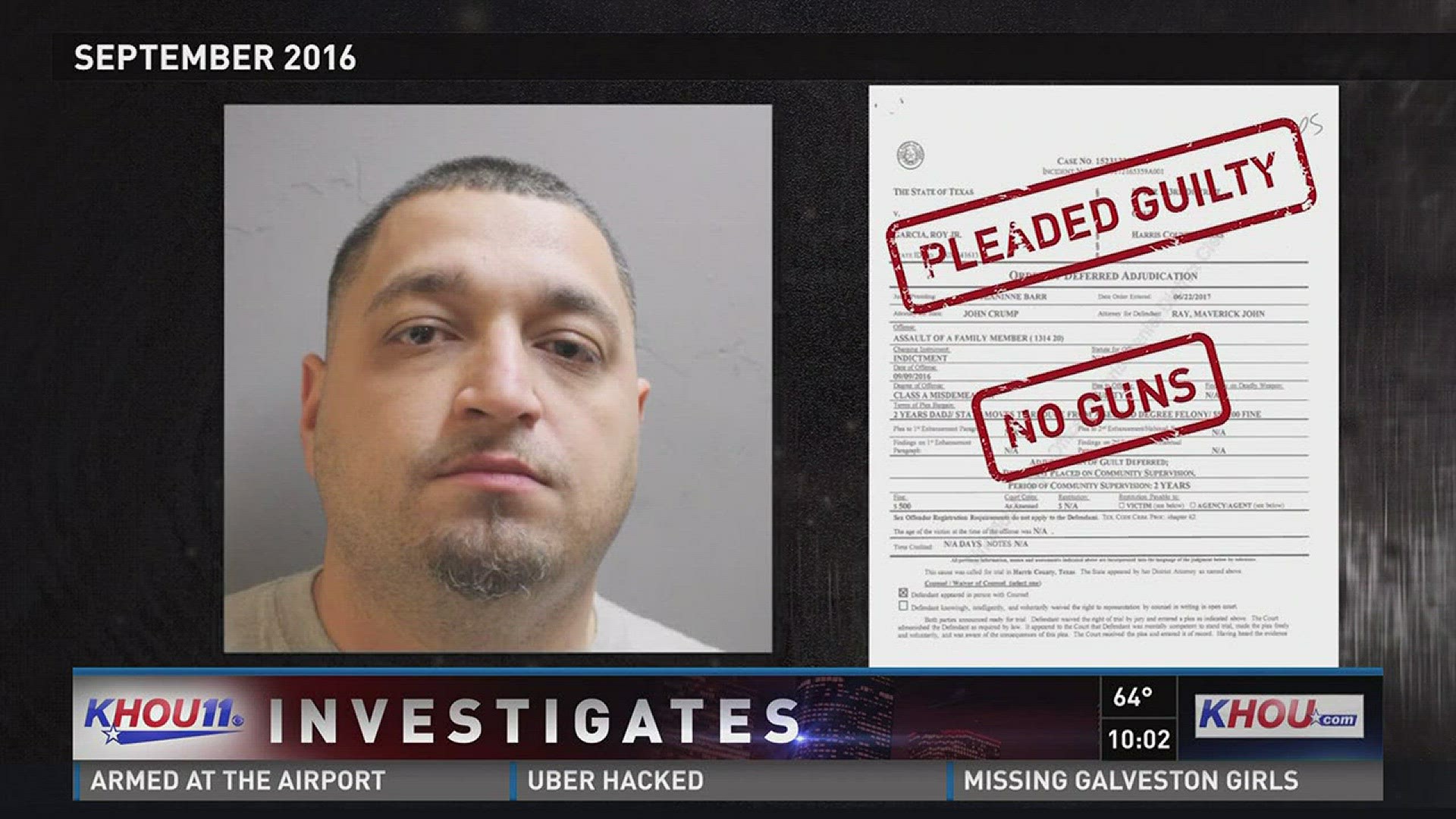When a gunman killed 26 people in Sutherland Springs earlier this month, his domestic violence past should have stopped him from owning a gun.
But little is done to enforce the federal and state law barring domestic violence abusers from owning guns, and he is one of many to commit more gun crimes, a KHOU 11 Investigation has found.
Among those offenders locally is Roy Garcia Jr. of Baytown. His common-law wife, Julie Martinez, couldn’t escape his abuse.
“She was the life of the party. She was just an awesome, awesome girl,” Martinez’ father, Joe Estrada, said. “We miss her dearly every day.”
In September 2016, Garcia shot at her and their three children while getting ready for school.
They survived, and Garcia pleaded guilty to the assault. He was forbidden, in writing, from having a gun.
But that didn’t stop him from allegedly murdering Martinez a year later, with a gun.
"There's not a checks and balance; who is going to check on me to see if I have a weapon, nobody,” Estrada said. "People need to wake up. There's always a danger lurking around the corner.”
In Harris County, the danger is real. KHOU 11 Investigates found more than 100 domestic violence offenders over the past three years went on to get charged with other gun-related crimes.
A dozen of them were murders, including Martinez’ murder. Other domestic violence offenders went on to be accused of aggravated assaults with a deadly weapon, aggravated robberies and kidnappings.
Start demanding action
Gun crimes by domestic violence offenders prove more accountability is needed, said Tracy Grinstead Everly, director of the Texas Council on Family Violence.
"We need to start demanding action and we need to start demanding action to make victims safer and offenders accountable,” Everly said. “If they have access to firearms, the next step is to use them.”
Time and time again, domestic abusers have used guns to commit mass shootings. The Orlando nightclub shooter, the Sutherland Springs gunman and – just last week – the man who opened fire on a school in California, all had a history of domestic violence.
Studies show more than half of mass shooters – those who kill four or more people at one time – had a history of domestic violence.
"I think across the country and the state that we can do better,” Everly said.
Across the country, only 14 states – California, Colorado, Connecticut, Hawaii, Illinois, Iowa, Massachusetts, Minnesota, Nevada, New Jersey, New York, Pennsylvania, Rhode Island, and Tennessee – and the District of Columbia have laws and programs in place to confiscate guns from domestic violence offenders, according to Everytown for Gun Safety, a nonprofit organization that advocates for gun control.
Texas law allows judges leeway in keeping guns out of domestic violence offenders’ hands, but does not require offenders to surrender their guns. Shortly after the Sutherland Springs shooting, lawmakers called for more oversight. Rep. Gina Hinosa, D-Austin, wrote an op-ed in the Texas Tribune calling for, among other things, a statewide gun surrender law.
Without a statewide law, a handful of counties have taken steps of their own.
Dallas Judge Roberto Cañas is one of the judges who developed a program to take guns from domestic violence offenders.
"I do believe it saves lives,” he said in an interview with KHOU sister station WFAA in Dallas.
Cañas also requires the surrender of guns for anyone with a civil protective order against them.
"It gives peace of mind to the judge, at least it does to myself,” he said.
Offenders, along with the victim and witnesses are asked whether the offender has a gun. If they do, they’re ordered to surrender that gun to law enforcement or transfer it to someone. The new owner signs an affidavit promising they won’t return it to the offender, or face consequences.
Along with Dallas County, Denton and Travis counties also have gun surrender programs, according to advocates.
New program in Harris County?
But in Harris County, there is no gun surrender program.
Judges and police are on board with the idea, Harris County Domestic Violence Coordinating Council Deputy Director Amy Smith said. But getting a program off the ground has been frustrating.
"They all agree that this is a great idea that we need to start this. It's getting the logistics done to figure out how are we doing to do this,” she said.
But for victims' loved ones, the time is not for talk, it's for action.
“I think that if we can continue this message and don't give up, I think that eventually we can get this point across to everybody,” said Joe Estrada, Julie Martinez’ father.
At the earliest, advocates say it may take a year to launch a gun surrender program in Harris County.
For perspective, in any given year, there are roughly 5,500 new domestic violence convictions in Harris County. Nobody knows how many have guns.
However, last year, 146 Texas women were killed by a current or former intimate partner. Sixty-eight percent of those women were shot to death.
Follow Jeremy Rogalski and Tina Macias on Twitter.

